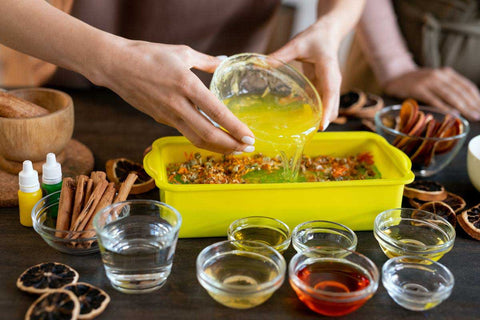Lemon rosemary soap is a terrific method to start producing your homemade glycerin soap bars, and this simple lemon soap recipe with the zest of a lemon rind is a great way to do it. There is no lye in this melt and pour soap recipe.

This handmade lemon zest soap doesn't even need a colourant; the zest offers enough yellow colouring for the bars and aesthetic intrigue and fresh lemon oil to balance the lemon essential oil used in the recipe. This simple DIY soap is a terrific choice if you appreciate giving homemade presents. It would make an excellent birthday or Mother's Day present.
Why Homemade Soaps?
Using homemade soaps produced with natural oils and butter rather than one prepared with synthetic chemicals and detergents will help your skin. Your skin will become smooth and supple after using homemade lemon soap.
Benefits of Homemade Lemon Soap
The largest organ in the body - is the skin. It is a body part that comes into contact with most of our daily care products and absorbs toxins, chemicals, and other substances found in commercial products.
On the other hand, Homemade soaps contain all-natural ingredients that are 100% safe for the skin and provide many benefits. Read on to know about the benefits of homemade soaps.

1. Harsh Chemicals Free
Most commercial soaps aren't soap. They're comparable to detergents in that they're mostly made using synthetic components. Parabens, triclosan, phosphorous etc., are substances that irritate and dry the skin.
Regular usage of these chemicals base products may lead to skin issues. On the other hand, homemade soaps that we produce with our own hands are composed of natural shea butter, clays, mineral colourants, and oils. The use of these soaps will nourish our skin.
2. Hydrates Skin For Long
Glycerin is a kind of lipid found naturally. Any soap made without glycerin is a detergent that can dry your skin.
It moisturizes and soothes the skin. To extend the shelf life of their products, many commercial soap manufacturers eliminate glycerin.
3. Removes Body Odor
The antimicrobial properties of DIY lemon soap are perfect for removing body odor. It will leave you fresh & odor free.

The smell of the lemon essential oil masks the unpleasant smell of sweat and other odors, while the antibacterial properties of the oil kill bacteria on your skin, thus reducing body odor.
4. Vegan Friendly
We will learn the Lemon soap recipe is vegan-friendly since they don't include animal fats, milk, or honey. They are cruelty-free and vegan.
5. No Negative Impact on the Environment
This DIY soap recipe contains biodegradable natural components. Meanwhile, synthetic compounds in commercial soaps, such as phosphorus, will impact the environment.
DIY Lemon Soap Recipe - Easy & Quick
This homemade lemon soap recipe smells incredible, and it's one you'll certainly want to try. The lemon zest adds a nice texture to the soap, and the citrus aroma will refresh your skin. This simple soap recipe makes a beautifully handcrafted present with only a few ingredients.

Homemade Lemon Rosemary Soap Recipe
Natural oils in this Lemon Rosemary Soap invigorate and cleanse your skin. With the help of these two essential oils, you can feel rejuvenated. Read on to know the ingredients that go into this homemade soap.
Ingredients Required For Making Lemon Soap
The lemon zest provides a bright tint when blended with melted soap. This recipe uses a melt and pours soap base since it's easy to work with and easily found online. Following are the ingredients and the exact quantities that you would require.
List Of Ingredients
- Melt and pour soap base – 1 pound
- Grapeseed oil – 4 Tsp
- Lemon essential oil – 1 Tsp
- Rosemary oil – 1 Tsp
- Dried Lemon zest of 3-4 lemons
Process Of Making Melt & Pour Lemon Soap
Apart from regular usage, this soap also works wonders when used as a kitchen soap. It works hard to eliminate cooking aromas on your hands. Use this to wash your hands after cutting onions or garlic, and you'll smell lemony fresh.

The lemon essential oil has natural cleansing and astringent characteristics, so your hands will feel amazing after applying it. Read on to find out the step-by-step recipe for making lemon rosemary soap.
- Break up the melt-and-pour soap base into tiny pieces. Microwave the soap pieces for 30 seconds at a time until completely melted. In between intervals, stir.
- After it melts completely, set it aside to cool down.
- When the temperature is 113 F, add grapeseed oil, lemon and rosemary essential oil.
- Add the lemon zest and stir well.
- Stir well until all ingredients are mixed.
- Fill the mould with lemon rosemary soap mix and set it aside to cool.
- Remove the soap from the mould after 24 hours and allow it to cure for 3 to 6 days before use.
Conclusion
DIY Lemon rosemary soap is a refreshing way to start the day and is ideal for those with oily or acne-prone skin. It is not harsh at all. Therefore it is suitable for every other skin type too. It also works exceptionally well as a kitchen soap and can be used to remove strong odors from hands.
It just provides additional skin-care advantages. Lemon rosemary soap is attractive, but it also has anti-ageing properties due to its high vitamin C content. It also helps to decrease acne by lowering excess oil. All the required ingredients are easily available on our website. Check Out our Website for More Details.












 Sign in
Sign in Register now
Register now My Reward Points
My Reward Points









